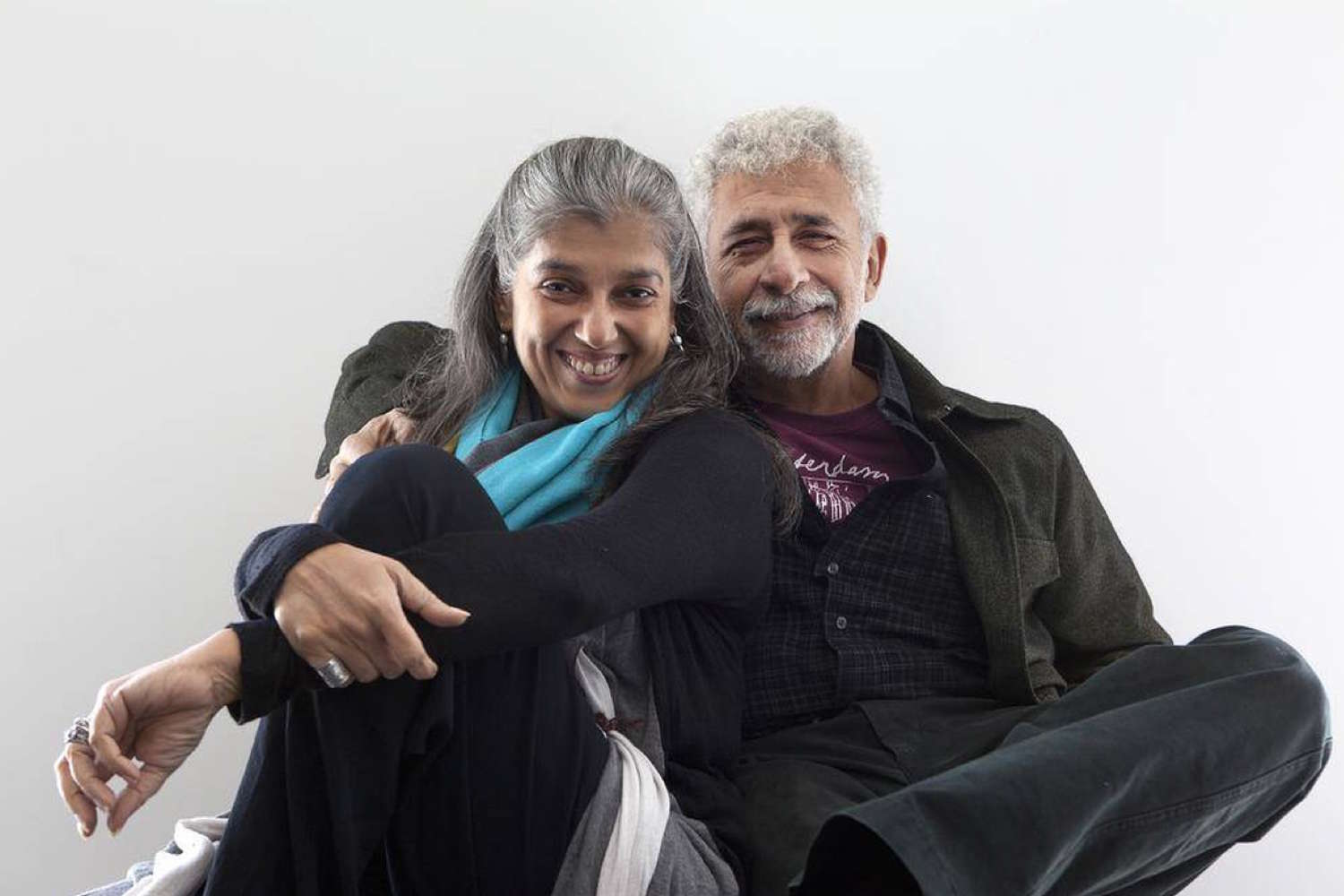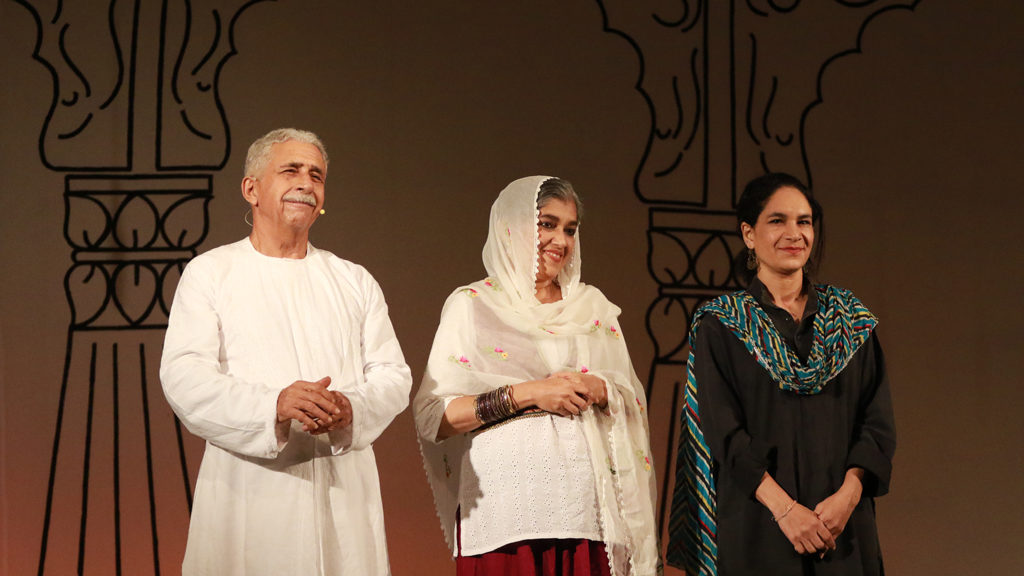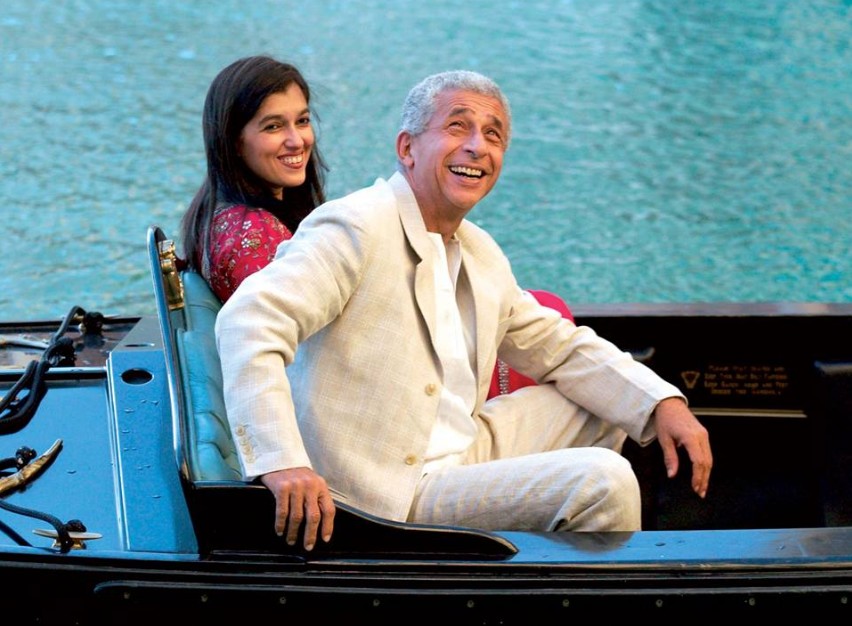
National Award winner, Naseeruddin Shah, has left an indelible mark on Hindi cinema and has inspired a generation of actors with his work in such films as Masoom, Jaane Bhi Do Yaaron, and Ishqiya. Ratna Pathak Shah made her film debut with Shyam Benegal’s Mandi in 1983, and went on to cement her status as a serious actor with impeccable comic timing with such TV shows as Idhar Udhar and Sarabhai vs. Sarabhai, and defied ageist stereotypes against actresses with her powerhouse performance in Lipstick Under My Burkha. Living legends and power couple, together they have made invaluable contribution to theatre, cinema, and television with their acting skills. We caught up with the husband-wife duo at the Delhi Theatre Festival, organised by Alchemist LIVE and presented by American Express, to discuss their play Ismat Apa ke Naam — a narration of three stories about women’s survival in a patriarchal society, written by Ismat Chughtai — and the status quo of Hindi theatre and cinema.
Most of Ismat Chughtai’s contemporaries believed that she was not overtly political and that her stories were more interpersonal. Do you think that’s a feminine trait?
Ratna: Different writers are interested in different things. In most stories, whatever you try to say comes across in the interaction between people. Hers was a time when there were more overtly political writers writing at the same time. She wasn’t a poster propagandist, but her stories are deeply political, particularly when it comes to gender relations. They are full of extraordinary understanding of the way in which men and women behave towards each other, and most importantly, of the way patriarchy works. She creates a real, live picture of what it is to be on the receiving end of patriarchy, and on the giving end; her special quality is that, both, the perpetrator of this kind of behaviour and the victim, are both seen with such understanding and empathy without any judgement, and that is her real skill.
Do you think we have been able to embrace the empathy that she was trying to evoke?
Ratna: No, not as a society for certain. In fact, we are in a society which is in a state of great flux, and one that does not know how to deal with it. We seem to be on the verge of moving backward rather than forward. Ismat belonged to a time when it was possible to imagine a real world of equality. It will take a long time; changing your own ideas does not happen overnight, forget about changing someone else’s.

(L–R) Naseeruddin Shah, Ratna Pathak Shah, and Sheeba Shah, after performing ‘Ismat Apa ke Naam’; Image: dhakatribune.com
[To Naseeruddin Shah] Since you’ve spent some time with Ismat Chughtai, can you tell us what she was like in person, considering she was so rebellious in her writing?
We met during the shooting of Junoon (1978), and I hadn’t read anything she had written. I was condescending towards Urdu literature, even though it is my mother tongue. She was the most charming, chatty, gossipy, funny person, and she enquired me about my self. She had seen my work as an actor, and would ask me about my family and tell me about hers. She was very interested in other people, and I think it is this quality that made her such a great writer. She didn’t wait around to be questioned. She did the questioning, which most celebrated people don’t bother to do.
You’ve mentioned earlier that Shakespeare and Shaw were the only great playwrights. Why did you not think much of Urdu literature?
Naseeruddin: I didn’t know anything then. I was completely ignorant. Shakespeare and Shaw were the only playwrights I was introduced to in school. Urdu, though one learned the alphabet at a very early age, never piqued my interest because English took over, and I was very stimulated by the fantastic poems and short stories I read. You can imagine the kind of Urdu poetry a Class 8 boy would get exposed to. Compared to The Rime of the Ancient Mariner or The Pied-Piper of Hamelin, all that gulab-sharab didn’t make any sense.
My proper introduction to Urdu poetry came many years later with Ghalib, and I was desperate to do a play in Urdu because Motley was becoming known as an English theatre group, which I resented. I can fully justify doing theatre in English, but I wanted to do something in my own language. Andha Yug and Aadhe Adhure — how many times are we going to repeat those? And frankly, off-hand, I can still think of only those two plays in Hindi because there is no equivalent in dramatic literature.
Ratna: Or something that has been popularised and pushed. We are so embarrassed about our own culture.
Art has been commercialised to the extent that we don’t know how to look at it anymore. What are your views on that?
Naseeruddin: It’s a double-edged sword, like the Indian Premier League (chuckles). On one hand, a lot of artists can sustain their efforts because art is priced this way. On the other hand, a lot of rubbish is being passed off as art and garnering high prices. It is gratifying to know that artists can now earn crores of rupees, but I don’t think it will lead to a general upping of standards.

Image: ntdTV.com
When you’re not working on a play or a film, what keeps you occupied?
Naseeruddin: We never let ourselves brood or dwell on the fact that there is nothing to do. I play tennis, I swim, watch a lot of movies, and read.
Ratna: I love meeting my friends and travelling around, and my work in education keeps me occupied. We have a farm, we love pottering around there. I think it’s wonderful to just do nothing.
Naseeruddin: Yeah, do nothing! Just weed the lawn for five hours and come away with a backache (laughs), watch your plants grow. It’s fabulous.
Do you think the Delhi theatre scene is lagging behind considering so many theatre stalwarts have had Delhi as their training ground?
Naseeruddin: I think so. Not only should it be more evolved, but there should be more activity here. Theatre Olympics notwithstanding, you come to Delhi to see the theatres and there is nothing on. In Mumbai, you can choose from thirty places to go to, on any given night, to see plays in Hindi, English, Marathi, Gujarati, and even in Bengali and Kannada.
Ratna: But that has evolved over the last 70–80 years, so it is not going to happen overnight. Now television and film — the recorded image — has become the primary medium of expression. It’s so much easier than going to a play.
When it comes to plays, they are primarily adaptations. There is not much original content. What is your take on that?
Naseeruddin: It’s very puzzling why our playwrights have not practised their art or gotten better. We don’t have screenwriters either. We are still in the stone age as far as filmmaking is concerned, relative to the rest of the world. The art of playwriting really seems to be dead. But the encouraging thing, at least in Bombay, is that a lot of young people are writing plays in the living, spoken language of the city, on issues that matter to them or are of immediate concern. Not all of them are good, but at least it’s a start.
Ratna: Most importantly, there is no money in it. We have a rich tradition of folk theatre which is quite different from the urban playwriting that we’re discussing. Its history is only 100–125 years old. Marathi theatre has had great playwrights. If they do 600 shows, and the playwright gets even 100 rupees per show, he makes 60,000. A Hindi play gets about six shows in six years. What will the playwright earn? It’s not possible to survive.
At the moment, the most prolific work is being done in the English language. I don’t know about American or German theatre, but the British nurture the idea of theatre from school. One can’t just wake up one day and decide to become a brilliant playwright. Shaw didn’t come out of nowhere. He stands on the shoulders of the hundreds of playwrights before him. One cannot write at home without acquiring the skills to do so, and unless you write and see it produced, you’ll never realise where the mistake is. Our education system does not promote free thinking, only rote, and we are steadily moving towards a more coercive system, as if it’s the 11th century.
But even in her time, Ismat Chughtai was restricted. She was a woman who rebelled and stood out, and that is still going to happen.
Ratna: Yes, that’s the hope, always.
Naseeruddin: Where there was one Ismat, hopefully there will be five now, maybe not with the same skills, but with the same beliefs, the same fire, or the same determination to walk their own path.
Ratna: There has to be an initiation. It’s all about building up. Would such a film as Tract or Lipstick Under My Burkha have been made ten years ago? If Bimal Roy was able to make a film in ‘63, Shyam Benegal could make one in ‘93 and, hence, Alankrita Shrivastava made one in 2017. It’s a gradual progression.
Naseeruddin: The trouble with such films as Nil Battey Sannata, Newton, Shubh Mangal Savdhan, or Tract is that they get crushed under weight of the monsters that occupy every little space, thus relegating them to a 9 a.m. show or an 11 p.m. show. So even if one wants to watch them, one is unable to.
Ratna: Then you wait for Netflix.
Naseeruddin: (chuckles) Netflix is the future. These multiplexes will disappear in the next 25 years.
How do you separate your personal and professional lives when you are working together on stage?
Naseeruddin: The roles don’t blend. I won’t say that we put it completely on the shelf; our work seeps into our personal lives, but most of the time, I don’t carry my work home, not my film work, at least, but theatre happens in our home; the rehearsals, the reading, the parties, etc. It is a part of our lives. As partners in everything, when Ratna does a production, I participate in it wholeheartedly, and vice versa. We discuss ideas over meals and in bed. However, it’s not as if it consumes our existence, or that we need to compartmentalise certain aspects of our lives.
[To Naseeruddin Shah] You haven’t directed any film since Yun Hota To Kya Hota. Do you intend to?
I might, but I doubt I feel confident enough to do so. I’d rather direct on the stage; I’d enjoy it more. If I direct another movie, it will be a niche movie, which I feel should be made, and that may or may not have an audience to appreciate it. So I feel whatever meaningful work one is hoping to do, is in the theatre.
[To Ratna Pathak Shah] Were you apprehensive about taking up the role of Usha buaji in Lipstick Under My Burkha?
I’m surprised when people ask me how I mustered the courage to pick a role like that. I’d be a fool to turn it down. I guess what it really boiled down to was that I knew that my family would have no objection and would, in fact, be proud of me. I never thought for a second about what my children would say about seeing their mother on screen in a role like that. The real achievement that we have managed within our family is that we don’t limit each others’ options.
As we come to the end of our interview, Prabhu Tony, COO, Alchemist Live emphasises the significance of Delhi Theatre Festival by stating, “Delhi enjoys a culture of theatre owing to the presence of National School of Drama (NSD) in the city. However Gurugram posed as a huge opportunity for us this year since the region lacks a platform while there is an apparent enthusiastic theatre audience. We are the very first company to have showcased this appetite in the region and aspire to continue to do the same in the future.”
Disclaimer: The opinions expressed are those of the interviewees, and do not necessarily reflect those of DSSC & its affiliates.
Featured Image Courtesy: bingedaily.in

